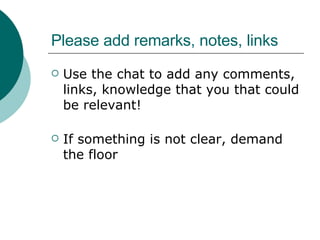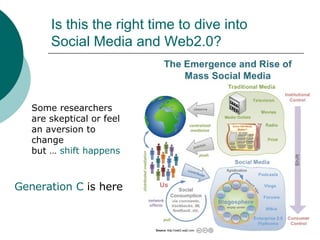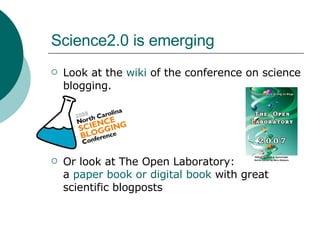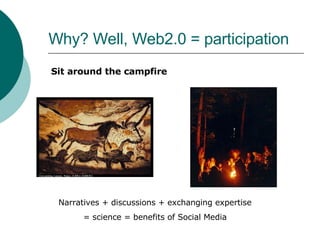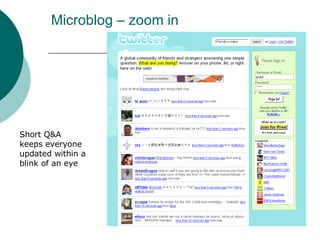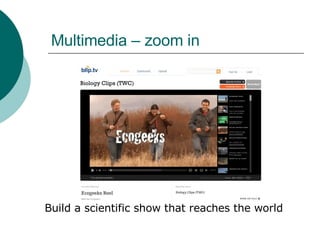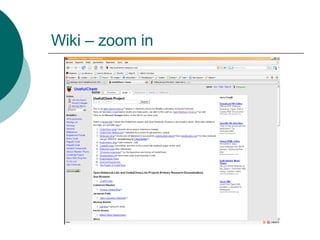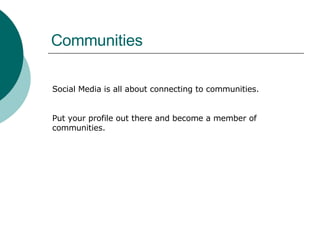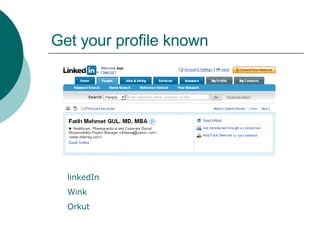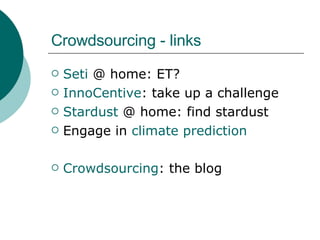Social Media Benefits For Researchers
- 1. Social Media: benefits for researchers by Inge de Waard
- 2. Please add remarks, notes, links Use the chat to add any comments, links, knowledge that you that could be relevant! If something is not clear, demand the floor
- 3. Web(2.0) was made for science Tim Berners-Lee created the idea of the World Wide Web in 1983 together with Robert Cailliau the WWW was turned into an instrument for scientific information exchange
- 4. Is this the right time to dive into Social Media and Web2.0? Some researchers are skeptical or feel an aversion to change but … shift happens Generation C is here
- 5. Closed => Open science Copyright and intellectual property => science commons - interested: podcast of John Wilbanks from Science Commons, interviewed by MIT Libraries News.
- 6. Science2.0 is emerging Look at the wiki of the conference on science blogging. Or look at The Open Laboratory: a paper book or digital book with great scientific blogposts
- 7. Lets digg in Why scientists embrace Web2.0? Looking at simple applications Diving in collaborative software Examples galore!
- 8. Why? Well, Web2.0 = participation Sit around the campfire Narratives + discussions + exchanging expertise = science = benefits of Social Media
- 9. Social Media = Connections lifelong learning + latest knowledge + (global) network = science = benefits of Social Media You and F2F colleagues You within network of institutional partners You within your global digital peer network
- 10. Web2.0 = (informal) learning Informal learning + personal content production = science = benefits of Social Media Social Media gives everyone the means of production - Harold Jarche Informal learning : definition and image by Jay Cross You write, you learn => the read and write Web
- 11. Web2.0 = personal & collaborative growth "A single ant or bee isn't smart, but their colonies are. The study of swarm intelligence is providing insights that can help humans manage complex systems, from truck routing to military robots." National Geographic learning is a process of becoming something (Stephen Downs on How the Net Works ). Wisdom of crowds
- 12. Diving in is easy Social Media is subscribing AND remembering username and password Use tag(s) to be able to retrieve relevant info.
- 13. simple Web2.0 applications: blog Write a post, publish it, enable others to comment/discuss Keep track of your work and thought flow Get in the top blogger list with Technorati Writing enhances thought and reflection
- 14. Blog – zoom in
- 15. Microblog – zoom in Short Q&A keeps everyone updated within a blink of an eye
- 16. Blog & microblog - links Blog start-up Wordpress Typepad Blogger Weebly … Microblog start-up Jaiku Twitter Twitter search (find a topic) Twitter apps Pownce …
- 17. One purpose Multimedia Record media and publish it in one purpose Web2.0 apps. Share your visual findings, record methods, show statistics… make your work known
- 18. Multimedia – zoom in Share images with your colleagues
- 19. Multimedia – zoom in Build a scientific show that reaches the world
- 20. Multimedia - links Flickr Photobucket Dropshot Blip.tv youTube.com Ustream.tv : real life streaming
- 21. Free bookmarks & references Sharing bookmarks saves time and gives your colleagues relevant immediate access. Surfing => reading => saving => sharing Tagging!
- 22. Bookmarks – zoom in
- 23. References – zoom in
- 24. Bookmark & reference - links bookmarks Del.icio.us Ma.gnolia references Connotea Pubmed CiteUlike Zotero
- 25. Collaborative software: wiki Wiki’s enable collaborative work on 1 web location web based => accessible from all around the world. It can be private or open, free or pay. You all write, build upon what is written, change… collaboratively No more scattered documents, just wiki.
- 26. Wiki – zoom in
- 27. Wiki - links Wiki Pbwiki Wikispaces Mediawiki Document sharing = online office Google docs Zoho Scribd Issuu
- 28. Communities Social Media is all about connecting to communities. Put your profile out there and become a member of communities.
- 29. Get your profile known linkedIn Wink Orkut
- 30. Engage in a community
- 31. Engage in a community
- 32. Community software - links Community building software Ning Elgg Find communities facebook Mybloglog
- 33. Crowdsourcing: what taking a task traditionally performed by an employee or contractor , and outsourcing it to an undefined, generally large group of people, in the form of an open call. ( wikipedia )
- 34. Crowdsourcing – zoom in
- 35. Crowdsourcing - links Seti @ home: ET? InnoCentive : take up a challenge Stardust @ home: find stardust Engage in climate prediction Crowdsourcing : the blog
- 36. One last thing: RSS Add a feed reader for easy (easier) content follow-up Syndication, picks up social media content and spreads it throughout the internet where it can be found by anyone looking for that information. See how it works (commoncraft). Some feed readers: Bloglines Google reader feedreader
- 37. Conclusions: benefits Social Media gives you: Network + personal profiling Narratives + discussions + exchanging expertise lifelong learning + latest knowledge + (global) network Informal learning + personal content production Most of it is web based => accessible from all around the world => It is easy, just do it!
- 38. Links Articles Scientific American Science2.0 Business Week Science2.0 Social Computing Magazine network strategies Social Computing Magazine on social media Books Wikipatterns by Stewart Mader Five minds of the Future , by Howard Gardner Tutorials – movies on how to Common Craft videos RSS how to movie
- 39. Thank you ! I will post this ppt on slideshare Blog: ignatiawebs.blogspot.com linkedIn: http://www.linkedin.com/pub/1/B09/452


